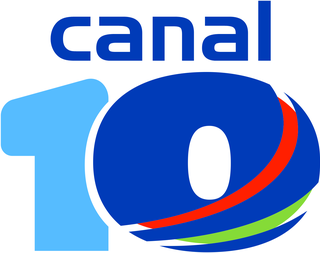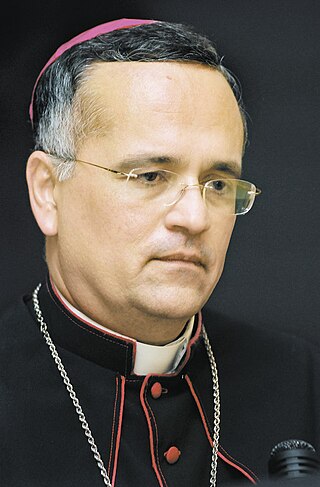Related Research Articles

José Daniel Ortega Saavedra is a Nicaraguan politician and the 58th president of Nicaragua since 10 January 2007. Previously, he was leader of Nicaragua from 18 July 1979 to 25 April 1990, first as Coordinator of the Junta of National Reconstruction from 19 July 1979 to 10 January 1985, and then as the 54th president from 10 January 1985 to 25 April 1990. During his first term, he implemented policies to achieve leftist reforms across Nicaragua. In later years, Ortega's left-wing radical politics cooled significantly, leading him to pursue pro-business policies and even rapprochement with the Catholic Church. However, in 2022, Ortega resumed repression of the Church, and has imprisoned prelate Rolando José Álvarez Lagos.

Enrique José Bolaños Geyer was a Nicaraguan politician who served as President of Nicaragua from 10 January 2002 to 10 January 2007.
Petróleos de Venezuela, S.A. is the Venezuelan state-owned oil and natural gas company. It has activities in exploration, production, refining and exporting oil as well as exploration and production of natural gas. Since its founding on January 1, 1976, with the nationalization of the Venezuelan oil industry, PDVSA has dominated the oil industry of Venezuela, the world's fifth largest oil exporter.
La Prensa is a Nicaraguan newspaper, with offices in the capital Managua. Its current daily circulation is placed at 42,000. Founded in 1926, in 1932 it was bought by Pedro Joaquín Chamorro Zelaya, who had become editor-in-chief. He promoted the Conservative Party of Nicaragua and became a voice of opposition to Juan Bautista Sacasa, for which the paper was censored. He continued to be critical of dictator Anastasio Somoza García, who came to power in a coup d'état.

General elections were held in Nicaragua on 5 November 2006. The country's voters went to the polls to elect a new President of the Republic and 90 members of the National Assembly. Daniel Ortega of the Sandinista National Liberation Front (FSLN) was elected president with 38% of the vote, defeating Eduardo Montealegre with 28%, José Rizo with 27%, Edmundo Jarquín with 6%, and Edén Pastora with 0.3%. The FSLN also emerged as the largest party in the National Assembly, winning 38 seats.

Canal 10, is a nationwide terrestrial television channel from Nicaragua owned by Radio y Televisión de Nicaragua, S.A. (RATENSA), a company founded by Mexican investors.

Canal 4 is a state-run nationwide terrestrial television channel in Nicaragua owned by Informativos de Televisión y Radio S.A. (Intrasa), a company owned by two sons of Nicaraguan President Daniel Ortega, Carlos Enrique "Tino" Ortega and his brother Daniel Edmundo. Until 2007, Remigio Ángel González of Albavisión owned 94% of the channel's assets, after that, the Ortega-Murillo family regained control.
Telenica is a nationwide state-run terrestrial television channel from Nicaragua, founded by Nicaraguan businessman Carlos Briceño in 1992. The channel was bought by Juan Carlos Ortega Murillo in late 2009, yet it was not made public until January 2010, the change in ownership led to a change in profile. TN8 is one of Nicaragua's main channels.

Rosario María Murillo Zambrana is a Nicaraguan politician and poet who is the Vice President of Nicaragua, the country's second highest office, since January 2017 and First Lady of Nicaragua since 2007 and from 1985 to 1990 as the wife of President Daniel Ortega. Murillo has served as the Nicaraguan government's lead spokesperson, government minister, head of the Sandinista Association of Cultural Workers, and Communications Coordinator of the Council on Communication and Citizenry. She was sworn in as vice president of Nicaragua on 10 January 2017. In August 2021, she was personally sanctioned by the European Union, over alleged human rights violations.
Canal 6 is a Nicaraguan terrestrial television channel broadcasting from the city of Managua. The station claims to be owned by the Government of Nicaragua, but is actually owned by a joint stock company called NEPISA
Television in Nicaragua has a history of more than fifty years. Canal 8, the first terrestrial television channel in the country, started broadcasting on July 15, 1956. Currently there are more than 15 national terrestrial and cable TV channels.

The protests against Daniel Ortega were a series of protests against President of Nicaragua Daniel Ortega and actions performed by his government, the dismantling of the opposition, and violence against peaceful protesters. The protests began in 2014, when the construction of the Nicaragua Canal was about to begin, and several hundred protesters blocked roads and clashed with police during the groundbreaking of the canal. Tens of thousands of Nicaraguans began to protest against President Ortega for what they believe to be a corrupt electoral system.
Silvio Enrique Conrado Gómez was the Nicaraguan director of the Central American Bank for Economic Integration (BCIE) serving from 2002 until his death. He was an economist. In 2007, he was a member of the Special Commission for the Promotion of Investments (Pro-Nicaragua). He was widely regarded as the key individual in the management of the financial resources and the macroeconomic stability of Nicaragua. Since 2002, he was also a director of the Central Bank of Nicaragua, and served a term as its president from 2006 to 2010.

The 2018 Nicaraguan protests began on 18 April 2018 following a move by the government of Daniel Ortega to reform social security. Following the deaths of protesters, demonstrations intensified and grew into a large anti-Ortega movement seeking his removal from office.

Silvio José Báez Ortega, OCD is a Nicaraguan Discalced Carmelite and a prelate of the Catholic Church. He earned a doctorate from the Pontifical Gregorian University, and then served primarily in Guatemala and the Vatican from 1989 to 2009. In 2009, Pope Benedict XVI appointed him an auxiliary bishop of the Archdiocese of Managua. He left Nicaragua and went into exile in April 2019 after receiving threats against his life.

The 2018 Nicaraguan protests began on 18 April 2018 when demonstrators in several cities of Nicaragua began protests against the social security reforms decreed by President Daniel Ortega that increased taxes and decreased benefits. After five days of unrest in which nearly thirty people were killed, Ortega announced the cancellation of the reforms; however, the opposition has grown through the 2014–2018 Nicaraguan protests to denounce Ortega and demand his resignation, becoming one of the largest protests in his government's history and the deadliest civil conflict since the end of the Nicaraguan Revolution. On 29 September 2018, political demonstrations were declared illegal by President Ortega.

The following lists events that happened during 2020 in Central America: Belize, Costa Rica, El Salvador, Guatemala, Honduras, Nicaragua, and Panama.

Cristiana Chamorro Barrios is a Nicaraguan journalist, nonprofit executive and political candidate. Vice-president of La Prensa, she was an aspiring presidential candidate in the 2021 Nicaraguan general election until the Ortega government disqualified her from running and ordered her arrest in early June 2021.
Grupo Ratensa is the Nicaraguan subsidiary of Albavisión, a Latin American media company owned by Guatemalan-Mexican-American businessman Remigio Ángel González. The company operates three main television channels—channels 9, 10 and 11—and previously had interests in channel 4, which González established with local Sandinista partners. In addition, Ratensa operates a network of radio stations. It claims to be "the most complete media network and the network with the widest reach in national television."
References
- ↑ Chamorro, Carlos F. (April 14, 2016). "The Right to Know About Albanisa". Confidencial .
- ↑ “The Sea, the Ship, and the Uncertain Course,” Revista Envío, May 2008, Number 322
- ↑ "Critics Question ALBANISA Energy Deal". Tico Times . September 4, 2009.
- ↑ "Albanisa: el nuevo emporio (Albanisa: the new emporium)". Confidencial. 9 June 2015. Retrieved 15 November 2021.
- ↑ "Canal 8 se está negociando". La Prensa. 11 December 2009. Archived from the original on 3 October 2019. Retrieved 26 June 2022.
- ↑ "Canal 8 vendido". El Nuevo Diario. 11 December 2009. Archived from the original on 2 October 2019. Retrieved 26 June 2022.
- ↑ "El Hotel Seminole, parte del grupo Albanisa, cierra operaciones en Managua". La Prensa (in Spanish). June 21, 2016. Archived from the original on January 17, 2025.
- ↑ "Nicaragua Congress approves purchase of bank tied to Venezuela's PDVSA". Reuters . March 7, 2019.
- ↑ Selser, Gabriela (April 25, 2019). "Nicaraguan bank sanctioned by US shuts down". Associated Press .
- ↑ "U.S. sanctions Nicaragua's petroleum company: U.S. national security adviser". Reuters . January 30, 2019.
- ↑ "The lethal blow to the companies owned by the "family", sanctioned by the US". Confidencial . July 7, 2021.